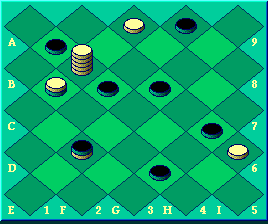Related Games
This page describes other similar games that predated Lasca, or that have been invented subsequently inspired by Lasca's unique features (in alphabetical order).
Accasta
Accasta is an abstract board game for two players invented by Dieter Stein in 1998[1]. It was influenced by Lasca and Wladyslaw Glinksi's Hexagonal Chess, and was one of the finalists of the Premio Archimede 1998 in Italy. A set is available from Spielstein Games & Puzzles:[2]
Baschni
Baschni (or Baschne) is a Russian variant of draughts/checkers, in which captured pieces are not taken from the board, but are put under the capturing stone and carried along as a prisoner. Emanuel Lasker stayed in Russia in 1896 and almost certainly played Baschni there, and this was probably the main inspiration for Lasca.
Baschni is played on an 8x8 board using the 32 black squares, with 12 pieces per player. The two double-corners make a draw possible by move repetition, a problem Lasker solved by making the Lasca board 7x7.
Bignor Ludus
Details of a game that existed in Roman times have recently been discovered at the Bignor Roman Villa archaeological site in West Sussex, England. Named Bignor Ludus after the site, it is practically identical to Lasca, although it is unlikely that Emanuel Lasker knew of its existence.
It differs from Lasca by the fact that only one capture is allowed per move.
Hexemergo
Hexemergo was developed from Lasca by Christian Freeling and Ed van Zon. They use Lasca's method of capture, but play starts with an empty board, and the first phase of the game involves placing pieces in turn[3].
Christian Freeling feels that Lasca's major fault is its retention of the promotion of soldiers to officers from draughts. In HexEmergo he removed the feature of promotion, and pieces are allowed to move in any direction from the start of the game.
The authors' MindSports Web site includes rules and strategy, problems, and downloadable Java applets which will allow you to play the game with beautiful graphics:[4]
- ^ Accasta Web site: http://accasta.com/
- ^ Spielstein Games & Puzzles: http://spielstein.com/games/accasta
- ^ R. Wayne Schmittberger: New Rules for Classic Games, John Wiley & Sons, Inc. New York, p. 177-180.
- ^ Hexemergo at Mindsports: http://www.mindsports.nl/index.php/the-pit/hexemergo-535


